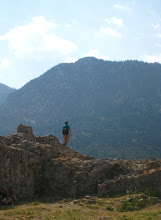Below follows a short poem by Cyriacus of Ancona who was a visitor to Greece and Byzantium in the first half of the fifteenth century. Cyriacus was a famous Renaissance scholar of Ancient Greece and part of the effort to revive the Greek classics in Italy. It is very interesting to note in this poem, a Greek translation of the original, his passion for Sparta, which he had the opportunity of visiting while staying at the court of Byzantine despot of Morea, Constantine Palaiologos, in Mystras, which overlooks ancient Sparta
Like many subsequent visitors to Greece fascinated by visions of Ancient Greece, Cyriacus's disdain is evident for the Byzantines, whom he views as responsible for the devolution of Sparta into the city of Mystras because of their 'cowardice and laziness.' Particularly disdainfully, Cyriacus distances himself from the Byzantines by stating that it was their generations who were responsible for the disappearance of all the great virtues and figures of Sparta.
However, what is particularly interesting about this poem is that it was translated into Greek at all because of its condescending tone towards the Greeks. It certainly warrants further investigation (I have not been able to consult Peloponnesiaka by Spyridon Lampros where the text is printed) into why this took place. Certainly, the 'he said' interjected into the poem would imply that this is a translation to report to the Greeks what Cyriacus was disdainfully saying about them after he had stayed with them.
Cyriacus of Ancona
Epigram to Sparta
in plain Greek translation
O famous Laconian city of Sparta, glory of Greece, model for the entire world, gymnasium and sacred precinct of arms
and temperance, and mirror and source of all other divine virtue. If I examine
your state, ethics, human law, with your other ethical virtues, and then I look
at you, I suddenly cry out to Eurotes, to the chorus of your most glorious
Artemis. Where is your good Lykourgos, where are the Dioskouroi, the twin gods
Kastor and Polydeukes, where is Anaxandridas, Orthryadas, and Gylippos. O
Eurysthenes and Leonidas, where are you staying? Where are you, Atreides and
Pausanias, o most excellent ruler Lysander, o Ariston, Agesilaos and
Xanthippos. Not Rome , Not Phillip, said, but time, as
well as the unmanliness and laziness of your generations made the city change into
Mysithra under Constantine .
[Update: I recently came across the original Italian poem Cyriacus wrote in D’Ancona, Cyriaco (2003) Later Travels. Ed. and trans. Edward W. Bognar.Cambridge , MA
Alma città laconica spartana,
gloria de Grecia, già del mondo exemplo
d'arme e de castità, gymnasio e templo
e d'ogni alma virtù specchio e fontana
se politia, costumi, e legge humana
con l'altre tue moral virtù contemplo
poi te remiro in Eurota, extemplo
exclamo al chor del'alma tua Diana
Dove è 'l tuo bon Lycurgo, ove Dioscori,
diri gemelli, Castore e Polluce?
Anaxandrida, Orythyada, e Gylippo,
Euriste e Leonida? Ove demori
Atride e Pausania? O chiaro duce
Lysandro, Aristo, Agesilao e Xanthippo?
Non Roma, non Phillipo
dixe: "Ma è 'l saecol vil vostro. Adconfino
la volta in Mysithra sub Constantino
Translated that is:
Great Laconian city of Sparta,
glory of Greece, once example to the world
of arms, chastity, gymnasium and temple
and mirror and font of every noble virtue
If I contemplate your constitution, customs, and human law
with your other moral virtues
then I marvel again at Eurotas; suddenly
I exclaim to the chorus of your great Diana
Where is your good Lycurgus, where are the Dioscori,
the dire twins, Castor and Pollux?
Anaxandrides, Orythyades, and Gylippus,
Eurystus and Leonidas? Where do you dwell
son of Atreas and Pausanias? O famous leader
Lysander, Aristo, Agesilaus, and Xanthippus?
Not Rome, not Phillip
said, "This is your wretched age. I assign
the turn to Mistra under Constantine.]
[Update: I recently came across the original Italian poem Cyriacus wrote in D’Ancona, Cyriaco (2003) Later Travels. Ed. and trans. Edward W. Bognar.
Alma città laconica spartana,
gloria de Grecia, già del mondo exemplo
d'arme e de castità, gymnasio e templo
e d'ogni alma virtù specchio e fontana
se politia, costumi, e legge humana
con l'altre tue moral virtù contemplo
poi te remiro in Eurota, extemplo
exclamo al chor del'alma tua Diana
Dove è 'l tuo bon Lycurgo, ove Dioscori,
diri gemelli, Castore e Polluce?
Anaxandrida, Orythyada, e Gylippo,
Euriste e Leonida? Ove demori
Atride e Pausania? O chiaro duce
Lysandro, Aristo, Agesilao e Xanthippo?
Non Roma, non Phillipo
dixe: "Ma è 'l saecol vil vostro. Adconfino
la volta in Mysithra sub Constantino
Translated that is:
Great Laconian city of Sparta,
glory of Greece, once example to the world
of arms, chastity, gymnasium and temple
and mirror and font of every noble virtue
If I contemplate your constitution, customs, and human law
with your other moral virtues
then I marvel again at Eurotas; suddenly
I exclaim to the chorus of your great Diana
Where is your good Lycurgus, where are the Dioscori,
the dire twins, Castor and Pollux?
Anaxandrides, Orythyades, and Gylippus,
Eurystus and Leonidas? Where do you dwell
son of Atreas and Pausanias? O famous leader
Lysander, Aristo, Agesilaus, and Xanthippus?
Not Rome, not Phillip
said, "This is your wretched age. I assign
the turn to Mistra under Constantine.]
